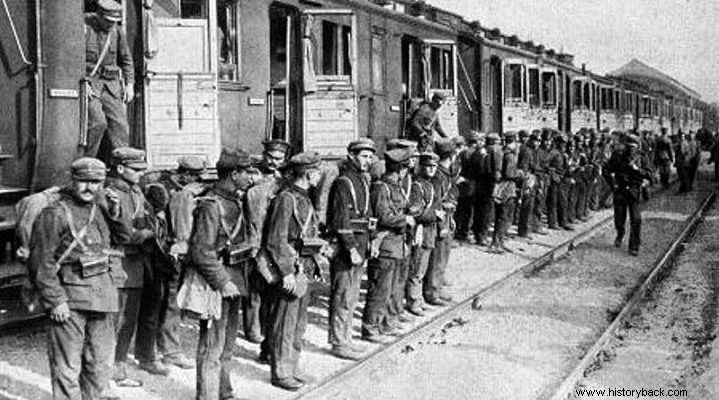
The outbreak of World War I found Greece divided. Prime Minister Eleftherios Venizelos sought the immediate inclusion of Greece in the war, on the side of the Entente. For him, tying Greece to the chariot of British politics was a one-way street. King Constantine, however, desired neutrality, which largely favored Germany's plans. The confrontation between the prime minister and the supreme ruler, regarding Greece's position in the war, will be the quintessence of National Division.
His Vassilis Kollarou
In August 1916, the National Defense Movement broke out in Thessaloniki, which had the support of the Anglo-French and intended to create an army for the entry of Greece on the side of the Entente. As early as October 1915, allied troops were in Thessaloniki at the invitation of Venizelos, but without the approval of the Parliament.
Essentially, it was a violation of neutrality and involvement of Greece in the Macedonian front. In May 1916, the German-Bulgarian troops occupied, without encountering serious resistance, the Rupel fortress. In the middle of August, of the same year, strong forces of the Bulgarian army, with a surprise attack, occupy Serres and Drama and arrive outside Kavala.
The surrender of the 4th Army Corps
The 4th Army Corps was based in Kavala and numbered 8,500 soldiers and 600 officers. During those difficult moments when the German-Bulgarians had invaded the Greek territory, the leadership of the Corps was in Athens! Only the commander of a Division, colonel Ioannis Hatzopoulos, had stayed behind, but even he, as a loyal follower of King Constantine's policy, passively observed the events.
The German-Bulgarians delivered an ultimatum to Hatzopoulos to hand over the city to them. He, after rejecting the British proposals to evacuate the city and transport the body by sea to Thessaloniki, surrendered Kavala to the invaders on August 29.
However, not wishing to surrender to the Bulgarians, he came to an agreement with the Germans, that they should be transported to Germany with all their armaments, where they would remain until the end of the world conflict. This decision of Hatzopoulos was not easily accepted by the body as a whole. Half of the men (3,500) escaped to Thassos and from there they ended up in Thessaloniki, while others escaped en route to Drama, and found refuge in the surrounding mountains, because from there the trains to Germany would start.>
The rest, along with the East Macedonian gendarmerie force, were loaded onto trains with a final destination of Geirlich, a city in Germany. It was a world first, for a large military body to be transferred, in wartime, to another (hostile to Venizelos and the Entente) country under conditions of voluntary captivity. For the Germans they were not prisoners, they were guests of the Kaiser!
Life in Girlitch
Greek officers and soldiers stayed at Gairlich from September 1916 to February 1919. They were given preferential treatment, especially the officers, but this did not negate the fact that they were subject to severe restrictions. One could not leave German territory without prior permission from the German military authorities.
In terms of their daily lives, many quickly became an integral part of the social and economic life of the city. On a personal level, several married German women and had children. They went so far as to publish a newspaper, Ta Nea to Gairlich.
On the other hand, however, deprivations (mainly for the common soldiers), diseases, unbearable cold and severe punishments for cases of indiscipline, which increased as time went by. Furthermore, there were no shortage of incidents between Venizelian and pro-Royal officers of the Corps, but also between Greeks and Germans.
This is how the months passed for the Greeks in Germany, until November 1918, when the first great war of humanity ended and it was time to return (Ger. Alexatos, The Greeks of Gairlitz, pp. 138-160) . READ THE EXCITING CONTINUATION OF THE REpatriation of GREEK POWER
